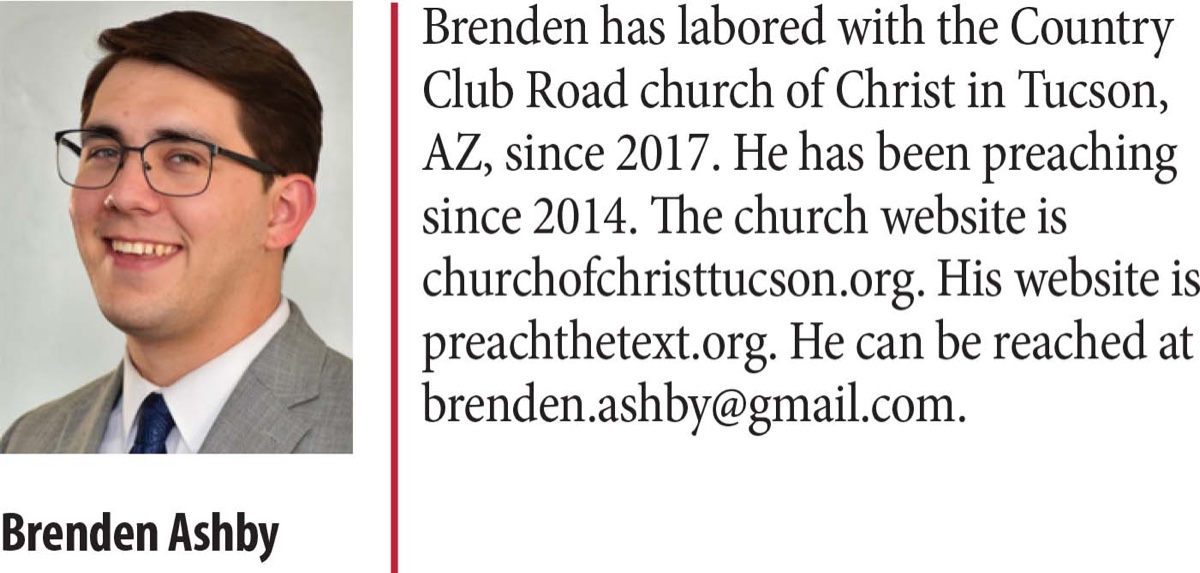
by Brenden D. Ashby
Synopsis: Satan has employed the same playbook since the beginning—tempting man through the lust of the flesh, the lust of the eyes, and the pride of life. Let us, therefore, not be ignorant of his devices.
After extolling the great examples of faith, the Hebrew writer says this, “Therefore, since we have so great a cloud of witnesses surrounding us, let us also lay aside every encumbrance and the sin which so easily entangles us and let us run with endurance the race that is set before us” (Heb. 12:1, NASB). Sin has a way of getting us all tangled up. Satan has a habit of taking us further than we ever wanted to go. We need to look no further than the beginning chapters of Genesis to see how quickly sin entangles people.
We begin in Genesis 3:1-7 with the fall of Adam and Eve. Man and woman had everything they could want or need in the garden. However, we read in Genesis 3:1, “Now the serpent was more crafty than any beast of the field which the Lord God had made.” He said to the woman, “Indeed, has God said, ‘You shall not eat from any tree of the garden’?” Satan slightly adjusts what God said to Eve. I believe Satan recognized Eve knew better, so he asked her a leading question that would allow him to sow seeds of doubt in her mind.
In the following verses, we see Eve answers correctly (vv. 2-3). This tree in the middle of the garden is the only one from which they are not to eat. Satan seizes on this, “You surely will not die!” he responds, “For God knows that in the day you eat from it your eyes will be opened, and you will be like God, knowing good and evil” (vv. 4-5). Satan cast his doubt, and now that doubt has been sown in Eve’s mind, she questions God’s command (Gen. 3:2-3). So, when she was near the tree of good and evil, she saw that the tree “was good for food, and it was a delight to the eyes, and that the tree was desirable to make one wise.” Blinded by desire, Eve felt justified in disobeying God: “She took from the tree and ate; she gave also to her husband with her, and he ate” (v. 6).
Satan neglected to tell her the consequences of this action. Quickly, man and woman go from living in peace with God to fear and shame before God (Gen. 3:10), pride in self (Gen. 3:12), and they are cast out from the presence of God (Gen. 3:22-24). We should all pause after reading this account and ask ourselves, do we accept the guilt and shame of our sin, or do we pridefully and evasively cast blame?
Unfortunately, we’re not done yet. Quickly, the biblical text moves from the world’s first sin to the first murder. We read in Genesis 4:1-15 of Cain murdering his brother Abel. The brothers come to offer a sacrifice to God, and we are told that Abel’s offering was acceptable, and Cain’s was not. Cain took issue with this. Harboring resentment toward his brother, he “became very angry and his countenance fell” (4:5). We would do well to remember at this point that such an attitude is sinful and, when left unchecked, sets us on a terrible downward path (cf. Matt. 5:21-24).
In response to Cain’s anger, God offered a warning. “The Lord said to Cain,”Why are you angry? And why has your countenance fallen? If you do well, will not your countenance be lifted up? And if you do not do well, sin is crouching at the door; and its desire is for you, but you must master it’” (4:6-7). God warns Cain here that he better put this attitude in check lest it lead to further sin. Yet, Cain does not listen; instead, he plotted and planned. Leading Abel out into the field where no one could hear or see what was happening, Cain committed the first murder. “It came about when they were in the field that Cain rose up against Abel his brother and killed him” (v. 8).
Like his parents, Cain wasn’t prepared for the consequences of his actions. God curses Cain because he shed innocent blood (Gen. 4:11). As a result, the ground would no longer yield its strength for him (4:12). In response, Cain selfishly cried out, “My punishment is too great to bear!” (4:13). The divine curse was not all the consequences of his sin. We read further that Cain “went out from the presence of the Lord” (4:16). Again, note how quickly sin can entangle a person. Here we might pause again and reflect: Did Cain learn anything from his parents’ sin? Have we learned anything from our previous sins? Part of not giving “the devil an opportunity” (Eph. 4:27) is learning from our past mistakes so we won’t commit them again.
In chapter five, we read of the descendants of Adam through the line of Seth (the child who replaced Abel). Starting in chapter six, we find that the sons of God (righteous men) married the daughters of men (unrighteous women). Generations of families lacking spiritual discernment resulted in a world where “the wickedness of man was great on the earth, and that every intent of the thoughts of his heart was only evil continually” (Gen. 6:5). God mourned over humanity’s fallen state (6:6). The consequences of this wickedness were unlike anything God had done before. God would “blot out man whom I have created from the face of the earth. . . for I am sorry that I have made them” (6:7).
Yet, not all is lost, and the world is not completely dark. Amid this wickedness, we find a man named Noah and his family, who were not like the people of that day and they found favor with God (Gen. 6:8). Because God found Noah and his family to be faithful, He spared them from the judgment of the flood.
It is incredible to see how quickly things spiraled out of control for humanity. We go from disobeying God’s command in the garden to the corruption of all mankind in six brief chapters. In each case we observed, sin quickly made a mess of things—taking individuals further than they probably thought possible, bringing consequences that they never anticipated or conceived.
After the flood, we find out that Noah had his faults and sins (just like any human). We also see man in an act of arrogance and pride, try to build something to rival God. Just as things seem to be getting dark again in the narrative of Genesis, we are introduced to Abram (later renamed Abraham) in Genesis 12:1. Moreover, we see God has a plan to remedy the sin problem that plagues humanity. We read in Genesis 12:3, “And I will bless those who bless you, and the one who curses you I will curse. And in you all the families of the earth will be blessed.” This promise God gave to Abram would ultimately be fulfilled through Christ (Gal. 3:16, 26-29). Through Jesus, God rendered powerless sin and death and provided the hope of eternity with Him. 


